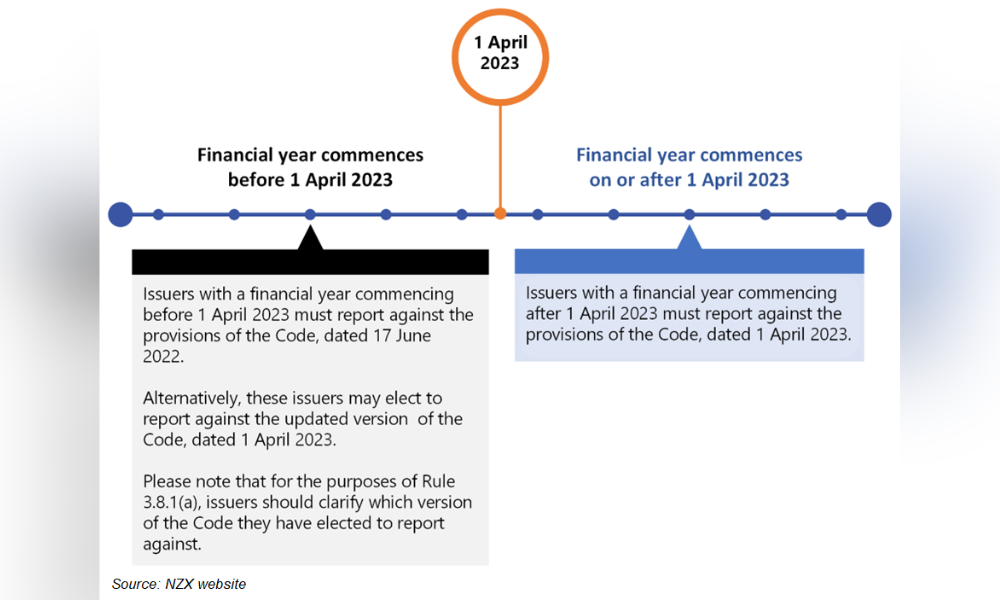
Reporting requirements are adjusted effective April 1

Following the consultations conducted last year and completion of the review of the NZX Corporate Governance Code and ESG Guidance Note, NZX has released the amendments to the Corporate Governance Code and the following related issuances:
The amendments to the code, listing rules and all three guidance notes will take effect on April 1, 2023. NZX has posted all amendments as mark-ups to the Corporate Governance Code, with initial proposed amendments marked up in blue and submitter feedback marked up in red.
As a result of the amendments, equity issuers must report against the amended Corporate Governance Code dated April 1, 2023 in respect of financial years which start on or after April 1.
Issuers whose financial year commences before April 1 may either continue to report against the old version of the Corporate Governance Code dated June 17, 2022, or voluntarily report against the Corporate Governance Code dated April 1. These issuers should thus clarify which version of the code they are reporting against.

NZX clarified that the duty to report against the code did not apply to debt or fund-only issuers.
Below are some of the prominent changes made to the Corporate Governance Code dated April 1, 2023.
Among other changes, the code now refers to the code of ethical behaviour, which constitutes one of eight principles of the code, as “ethical standards.”
While the code continues to adopt the ‘comply or explain’ reporting framework, NZX has given an in-depth guidance on how an issuer may explain its adoption or non-adoption of a recommendation. It encouraged issuers to make disclosures and the specific NZX recommendations they are relevant to easy to locate by using an index or sub-headings in its corporate governance statement.
Where an issuer did not adopt a recommendation, NZX urged issuers to avoid templated disclosures and instead provide informative explanations as to why a particular recommendation was not adopted fully or in part.
The Corporate Governance Code now adopts the approach taken in Australia for director independence. NZX now recommends that every issuer disclose in its annual report or website the board’s assessment of a director’s independence – including why a director is still deemed independent despite the presence of factors the code has flagged for non-independence.
NZX also recommends that the chair of the board and the CEO be different people, consistent with the approach taken by the ASX and UK Financial Reporting Council.
The Corporate Governance Code has also been amended to support investor-issuer communications. It now recommends that issuers design their shareholder meetings in a manner that encourages shareholder participation and give shareholders the option to receive issuer communications electronically.
Effective April 1, the code also contains more detailed recommendations on non-financial reporting, which would include ESG factors and practices as well as other non-financial disclosures. NZX requires an issuer to provide non-financial disclosures at least every year, either as a part of its annual report – in which case the annual report must provide a link to the disclosures – or in a standalone report.
NZX has also released the marked-up changes to its ESG Guidance Note effective April 1.